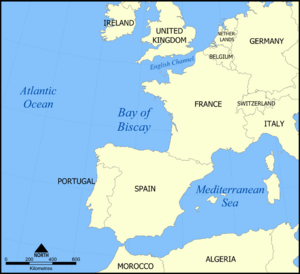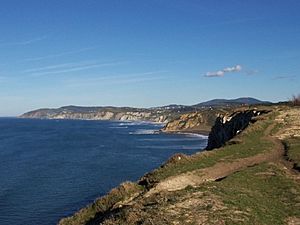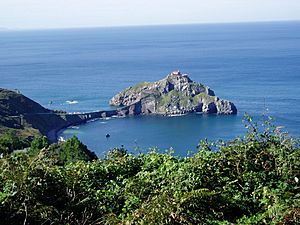Bay of Biscay facts for kids
The Bay of Biscay is a gulf of the northeast Atlantic Ocean south of the Celtic Sea. It is along the western coast of France from Brest south to the Spanish border, and the northern coast of Spain west to Cape Ortegal. It is named in English after the province of Biscay, in the Spanish Basque Country.
The average depth is 1,744 metres (5,722 ft) and maximum depth is 2,789 metres (9,150 ft).
The Bay of Biscay is home to some of the Atlantic Ocean's worst weather. Large storms occur in the bay, especially during the winter months. Until recently ships would be wrecked in Biscay storms, and many lives were lost. Improved ships and weather prediction have helped to reduce these problems.
Contents
Rivers
The main rivers that empty into the Bay of Biscay are:
- France (north to south): Loire, Charente, Garonne, Dordogne, Adour, Nivelle.
- Spain (east to west): Bidasoa, Oiartzun, Urumea, Oria, Urola, Deba, Artibai, Oka, Nervión, Agüera, Asón, Miera, Pas, Saja, Nansa, Deva, Sella, Nalón, Navia, Esva, Eo, Landro, Sor.
Main cities
The main cities on the shores of the Bay of Biscay are:
- France: Brest, Nantes, La Rochelle, Bordeaux, Bayonne, Biarritz.
- Spain: Donostia-San Sebastián, Bilbao, Santander, Gijón, Avilés.
Wildlife
Many species of whales and dolphins can be seen in this area. It is one of the few places where the beaked whales such as the Cuvier's beaked whale have been seen frequently. This is the best study area for beaked whales in the world. The best areas to see the larger cetaceans are in the deep waters beyond the continental shelf.
Images for kids
-
Biarritz Beach (French Basque Country)
See also
 In Spanish: Golfo de Vizcaya para niños
In Spanish: Golfo de Vizcaya para niños





